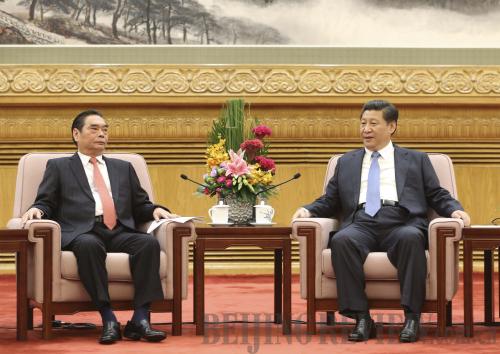|
 |
|
SOOTHING TENSIONS: Chinese President Xi Jinping (right) meets with Le Hong Anh, special envoy of Vietnamese Communist Party General Secretary Nguyen Phu Trong, in Beijing on August 27 (DING LIN) |
Sino-Vietnamese ties have remained strained since a series of riots struck Chinese companies in south and central Viet Nam in mid-May, during which five Chinese nationals were killed. But at last these tensions have begun to show signs of improvement.
Le Hong Anh, a Politburo member and standing secretary of the Secretariat of the Central Committee of the Communist Party of Viet Nam (CPV), paid a visit to China on August 26-27 as the special envoy of CPV Central Committee General Secretary Nguyen Phu Trong.
When meeting with Anh in Beijing on August 27, Chinese President Xi Jinping, also General Secretary of the Central Committee of the Communist Party of China (CPC), said, "A neighbor cannot be moved away, so it is in the interests of both sides to be friendly to each other."
"I hope the Vietnamese will make joint efforts with the Chinese to put the bilateral relationship back on the right track of development," Xi said.
Earlier the same day, talks were held between Anh and Liu Yunshan, a member of the Standing Committee of the Political Bureau of the CPC Central Committee. According to a three-point agreement reached between the two sides, China and Viet Nam will earnestly implement a basic guideline for the resolution of China-Viet Nam maritime issues signed in October 2011.
They agreed to seek lasting solutions acceptable to both sides by focusing on making the most of bilateral border negotiations, studying and discussing joint exploration of the South China Sea, and avoiding actions that might complicate and expand disputes while safeguarding the overall stability of bilateral relations and peace in the South China Sea.
This was the second high-level contact between China and Viet Nam over the current tensions, the first of which came when Chinese State Councilor Yang Jiechi paid a visit to Viet Nam in mid-June. During talks with Vietnamese officials, Yang urged them to take measures to contain anti-China riots and ensure the safety of Chinese investment and nationals in Viet Nam.
A day before Anh's departure for Beijing, Vietnamese Foreign Ministry spokesman Le Hai Binh made a statement saying that the Vietnamese Government expressed their regrets over the unfortunate episode (in mid-May) and the ensuing injuries and deaths of Chinese workers.
The spokesman said that Viet Nam will provide some form of humanitarian compensation to affected Chinese workers, and will send delegations to China to meet with representatives of those workers' families.
Viet Nam also promised in the statement to take measures to help and support affected Chinese enterprises, carry on the investigation into the incident and severely punish those responsible, and ensure the safety and security of Chinese personnel and enterprises in Viet Nam.
In response, Chinese Foreign Ministry spokesman Hong Lei told a press conference on August 25, "China acknowledges the steps and positions the Vietnamese side has taken, and hopes earnest efforts can be made to implement relevant measures."
The riots targeting foreign companies in mid-May were the most severe in Viet Nam in the last 30 years. Around 20 foreign factories were burned down and some 1,100 foreign companies were affected.
As a result of the riots, foreign businesses have cast a wary eye to Viet Nam's investment environment. Foreign direct investment in the country fell 35 percent in the first half of this year compared with the same period a year earlier.
The Vietnamese Government said that China's deployment of an oil rig in the South China Sea was a trigger for the riots. Despite taking a subdued response to the dispute at the beginning, Viet Nam suddenly adopted a more confrontational stance following a visit by U.S. Assistant Secretary of State for East Asian and Pacific Affairs Daniel R. Russel on May 7.
China takes a consistently positive and friendly approach by inviting neighboring countries to cooperate on oil and gas exploration in the South China Sea, said Zhou Qi, a researcher at the Chinese Academy of Social Sciences.
Viet Nam has established a number of oil rigs in disputed waters in the South China Sea over the past years. If Viet Nam attempts to stop China from building an oil rig in its territorial waters, that would be unacceptable to China, Zhou added.
Observers say that Viet Nam has to talk with its largest neighbor, China, as both sides share extensive common interests.
For example, China is the largest source of imports for Viet Nam. In the first seven months, agricultural production tools and supplies imported from China increased nearly 20 percent.
In light of the current complicated international situation, seeking cooperation and resolving differences are important for both countries, Anh said in Beijing, expressing his belief in the resumption of Viet Nam-China cooperation.
Email us at: baishi@bjreview.com | 